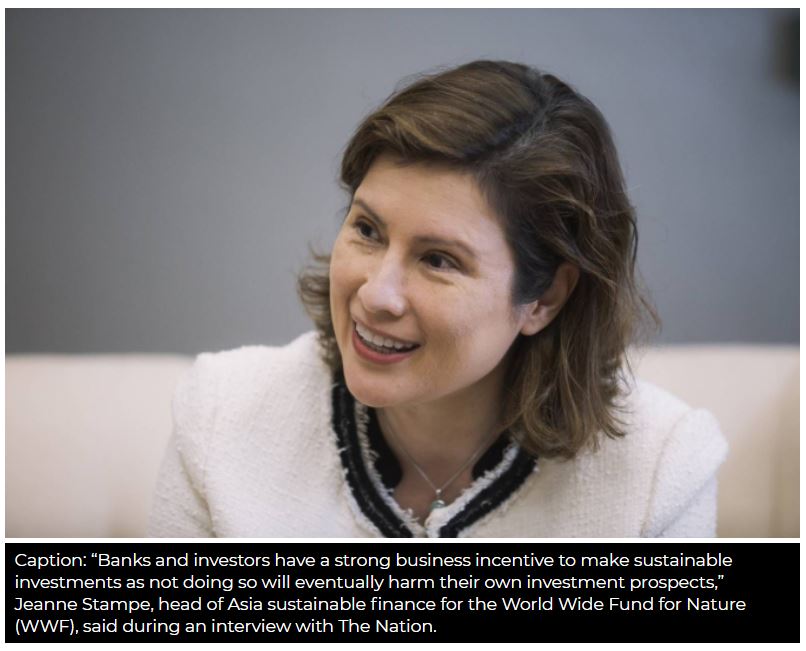Asean set to launch guidelines for sustainable investments
On Tuesday, the World Wide Fund for Nature (WWF) and the Thai Bankers’ Association (TBA) jointly released the official guidelines for building the capacity to cope with environmental, social and governance (ESG) risks.
“The guidelines represent a sustainable finance initiative in Thailand and promote sustainable loans and investments,” said Jeanne Stampe, head of Asia sustainable finance at the WWF.
The non-governmental organisation has been working with other countries in the region such as Indonesia and Malaysia to produce similar guidelines to promote sustainable financing throughout the Asean region, Stampe told The Nation during an exclusive interview.
The WWF has also been working with financial institutions in Asean on the Principles for Responsible Banking (PRB), which will be officially launched in September. More than 50 financial institutions from both Asia and the West have already agreed to the PRB before launch, she stated.
“Asean banks that have agreed to this principle beforehand include those from Singapore and Malaysia such as CIMB bank,” Stampe said.
Institutions that sign the PRB agreement, she said, must commit to a “no-deforestation policy” over time. After the principle is launched, a timeframe will be given to each bank to adjust their policies in accordance with the principle.
On the investor side, there has been a growing demand for sustainable investments which has led to the establishment of the “Climate Action 100+” investor initiative in 2017.
Currently, 300 global investors have joined the initiative with combined assets under management of US$30 trillion, according to the WWF official.
This gives investors the bargaining power to shift the policies of large corporations such as financial institutions and promote more sustainable investments throughout the world, Stampe said.
Key Asian institutional investors that have joined the initiative include the Japanese Government Pension Investment Fund and the Malaysian public pension fund Kumpulan Wang Persaraan with total assets under management of $1.5 trillion and $29 billion respectively.
“Going forward, institutional investors and banks will have to increase their cooperation to promote more sustainable investments with low ESG risks,” Stampe continued. “Both parties have business interests to promote sustainable business as environmental issues such as natural disasters and social issues such as social unrest can lead to significant investment losses.”
Meanwhile, the involvement of the public sector is also crucial for the promotion of sustainable business, said Ma Jun, chairman of the China Society for Finance and Banking’s Green Finance Committee, in a separate interview.
“All stakeholders must work together to build an ecosystem that incentivises financial institutions and investors to make sustainable investments,” he said.
For instance, the government can step in and offer tax incentives for “green investments” or provide interest subsidies for “green projects”, he said.
Ma also suggested that banking associations must work closely with the central bank and agree to a universal standard for sustainable investments, using China’s case as an example.
In China, he said, commercial banks and the central bank have agreed to a universal standard for sustainable investment that requires banks to disclose all environmental investments so the public are informed if banks are making environmentally unsustainable investments.
Without the involvement of the public sector, there may not be enough financial incentive for banks to make sustainable investments when capital gains can still be made on current industrial ventures.
If the public sector does not play an active role in this matter, by the time the private sector acts on environmental issues, it may already be too late, he cautioned.
Source: https://www.nationthailand.com/business/30374832


 Thailand
Thailand




